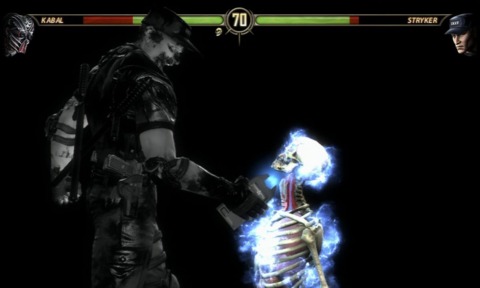High Time for a Digital Divorce
Has the marriage of inconvenience between retailers and publishers reached a turning point?
Once upon a time, retailers and publishers enjoyed a happy union, with both parties pulling toward the same end: selling games. The more that sold, the better it was for both of them. Retailers needed someone to fund and create titles, and publishers needed someone to get those games into consumers' hands. It was a mutually beneficial system, until the temptress known as digital distribution entered the picture.
In every unsuccessful relationship, there comes a point of no return. It's a point past which the union cannot be saved. But it's almost never at the end of the relationship. Things instead are drawn out, with confused participants believing that perhaps things are still salvageable, feeling that they owe it to their shared history to keep working through things. It's understandable, but the inability to recognize when that point of no return is crossed only leads to prolonged and compounded miseries. For retailers and publishers, that point was the moment digital distribution became a legitimate way to sell games.
As Valve's nearly ubiquitous Steam service set the standard for downloadable PC games and Xbox Live Arcade spawned the first hit downloadable titles on consoles, publishers fantasized of a future where they didn't need retailers. After all, the only thing retailers did was serve as middlemen between the game makers and their customers, someone to buy a game for somewhere in the neighborhood of $50 and then turn around and sell it for $60.
But now that publishers' digital distribution efforts represent a clear threat to retailers, the relationship is getting awkward. Retailers like Amazon, Target, Best Buy, and Wal-Mart have jumped into the used-game business, a practice that publishers see as taking money directly out of their pockets since they don't get a cut of secondhand sales.
In acknowledgement of the coming cataclysm, the largest used-game seller of them all, GameStop, has been acquiring its way into direct competition with its partner publishers. Since 2009, GameStop has purchased its own online gaming portal, Kongregate, a downloadable storefront in the Steam competitor Impulse, and even a game developer and publisher in Jolt Online.
But at the same time, the retailers are getting chummy with publishers on marketing initiatives and preorder incentives, often to the detriment of consumers. Take a look at Electronic Arts' new Season Ticket promotion, which touts GameStop as a retail partner even though it has no retail component. For $25 a year, EA Sports fans get a handful of perks, chief among them the ability to download titles like Madden NFL 12 and FIFA 12 several days before they arrive in stores. The downloaded editions of the game will be complete and fully functioning, indistinguishable from their on-disc counterparts (except for, perhaps, improved load times). However, to keep retailers happy, EA is making sure those downloaded versions will stop working on the day of the game's retail release. So any gamers who put down the $25 for the subscription and downloaded a hefty multi-GB file to their console still need to make the trek to GameStop or Wal-Mart or wherever to buy a physical copy of the game they've already been enjoying for days. Presumably, GameStop is marketing the Season Ticket promotion in its stores in exchange for EA inconveniencing its own customers like that.
Clearly, there are no technical hurdles remaining in the path of digital distribution. This is simply publishers hamstringing an offering to consumers because it somehow appeases their retail partners. And it's far from the only time gamers are hurt by the intricate political dance taking place between the two parties.
Consider the changing approach to preorder incentives. Publishers want to push reservations as much as possible because retailers order each game based in part on the preorder activity surrounding it. A retailer with an "exclusive" add-on will market it in stores and e-mail newsletters, giving customers a reason to pick the game up from that chain instead of a competitor with no perks.
This started innocently enough. "A Viewtiful Joe bobblehead for picking the game up at GameStop? Yes, please." But now the web of exclusives has resulted in some pretty substantial content being split up between multiple retailers. For Mortal Kombat's launch, Warner Bros. Interactive Entertainment introduced the uniquely abhorrent concept of retailer-exclusive fatalities. WBIE created classic costumes and fatalities for Sub-Zero, Scorpion, and Reptile, but split them up as exclusive preorder bonuses for Best Buy, GameStop, and Amazon, respectively.
That ignoble experiment apparently worked out pretty well for WBIE, as the publisher is expanding on that approach with this fall's Batman: Arkham City. Best Buy has a new playable character in Robin. Amazon has a comic book. GameStop has a challenge map in North America and a Batman Beyond-inspired skin in the UK. British retailer ShopTo.net has a 1970s-look Batman skin, while New Zealand outfit Mighty Ape has a pack of three different skins. So depending on where diehard Bat fans purchase their game, they could be dropping $150 on a premium edition and still be missing out on a level, a playable character, a comic book backstory, and a handful of character skins.
Again, the consumer winds up being hurt here. To keep up relations with its retail partners and get a bit of help marketing its game, Warner Bros. Interactive Entertainment has spread the exclusives far and wide, ensuring that all but the most spendthrift fans will miss out on some content they'd love to have at launch.
The relationship has soured and is producing increasingly irrational behavior from all parties. Sony launched a digital-distribution-only hardware platform, the PSP Go, and sold it through retail stores, even though those outlets had virtually no incentive to carry the hardware, much less promote it (PSN points cards didn't count in a pre-PSN security breach world). And it's not like Sony really went out of its way to promote the thing, either. The phrase "sent to die" comes to mind.
By this point, there's little denying that retailers and publishers are trapped in a broken, loveless marriage, and it needs to end. Both sides are acting erratically, tiptoeing around each other, afraid to confront the truth of the situation and the seemingly inevitable dissolution of the relationship. Unfortunately, both sides still need each other at the moment, as the bulk of the gaming business remains in retail. However, that segment has been trending downward since 2007, and publishers are now madly chasing the growth where it can be most easily found: in digital revenue streams.
However this plays out in the next 10 years or more, a schism is coming. The sooner the separation can be made, the more civil, sane, and mutually beneficial the situation will be afterward. But given what we've already seen, I'm betting this is going to be one ugly, messy, acrimonious divorce.
Got a news tip or want to contact us directly? Email news@gamespot.com


Join the conversation